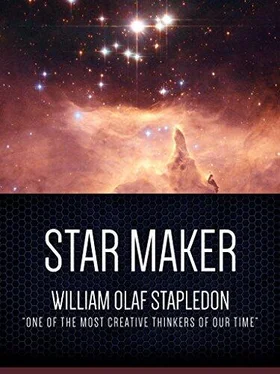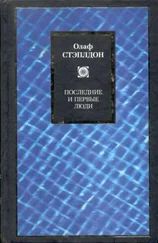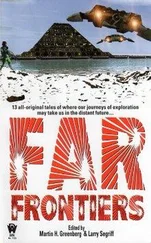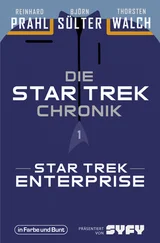One very small and rather uncommon kind of artificial world consisted almost wholly of water. It was like a titanic bowl of gold-fish. Beneath its transparent shell, studded with rocket-machinery and interplanetary docks, lay a spherical ocean, crossed by structural girders, and constantly impregnated with oxygen. A small solid core represented the sea-bottom. The population of Ichthyoids and the visiting population of Arachnoids swarmed in this huge encrusted drop. Each Ichthyoid would be visited in turn by perhaps a score of partners whose working life was spent on other worlds. The life of the Ichthyoids was indeed a strange one, for they were at once imprisoned and free of all space. An Ichthyoid never left his native ocean, but he had telepathic intercourse with the whole Symbiotic race throughout the sub-galaxy. Moreover, the one form of practical activity which the Ichthyoids performed was astronomy. Immediately beneath the planet's glassy crust hung observatories, where the swimming astronomers studied the constitution of the stars and the distribution of the galaxies.
These "gold-fish-bowl" worlds turned out to be transitional. Shortly before the age of the mad empires the Symbiotics began to experiment for the production of a world which should consist of a single physical organism. After ages of experiment they produced a "gold-fish-bowl" type of world in which the whole ocean was meshed by a fixed network of Ichthyoid individuals in direct neural connection with one another. This world-wide, living, polyp-like tissue had permanent attachments to the machinery and observatories of the world. Thus it constituted a truly organic world-organism, and since the coherent Ichthyoid population supported together a perfectly unified mentality, each of these worlds was indeed in the fullest sense a minded organism, like a man. One essential link with the past was preserved. Arachnoids, specially adapted to the new symbiosis, would visit from their remote planets and swim along the submarine galleries for union with their anchored mates.
More and more of the stars of the outlying cluster or sub-galaxy came to be girdled with rings of worlds, and an increasing number of these worlds were of the new, organic type. Of the populations of the sub-galaxy most were descendants of the original Ichthyoids or Arachnoids; but there were also many whose natural ancestors were humanesque, and not a few that had sprung from avians, insectoids or plant-men. Between the worlds, between the rings of worlds, and between the solar systems there was constant intercourse, both telepathic and physical. Small, rocket-propelled vessels plied regularly within each system of planets. Larger vessels or high-speed worldlets voyaged from system to system, ex-plored the whole sub-galaxy, and even ventured across the ocean of emptiness into the main body of the galaxy, where thousands upon thousands of planetless stars awaited encirclement by rings of worlds.
Strangely, the triumphant advance of material civilization and colonization now slowed down and actually came to a standstill. Physical intercourse between worlds of the sub-galaxy was maintained, but not increased. Physical exploration of the neighboring fringe of the galactic "continent" was abandoned. Within the sub-galaxy itself no new worlds were founded. Industrial activities continued, but at reduced pressure, and no further advance was made in the standard of material convenience. Indeed, manners and customs began to grow less dependent on mechanical aids. Among the Symbiotic worlds, the Arachnoid populations were reduced in number; the Ichthyoids in their cells of ocean lived in a permanent state of mental concentration and fervor, which of course was telepathically shared by their partners.
It was at this time that telepathic intercourse between the advanced sub-galaxy and the few awakened worlds of the continent was entirely abolished. During recent ages, communication had been very fragmentary. The Sub-Galactics had apparently so far outstripped their neighbors that their interest in those primitives had become purely archaeological, and was gradually eclipsed by the enthralling life of their own community of worlds, and by their telepathic exploration of remote galaxies. To us, the band of explorers, desperately struggling to maintain contact between our communal mind and the incomparably more developed minds of these worlds, the finest activities of the Sub-Galactics were at present inaccessible. We observed only a stagnation of the more obvious physical and mental activities of these systems of worlds. It seemed at first that this stagnation must be caused by some obscure flaw in their nature. Was it, perhaps, the first stage of irrevocable decline? Later, however, we began to discover that this seeming stagnation was a symptom not of death but of more vigorous life. Attention had been drawn from material advancement just because it had opened up new spheres of mental discovery and growth. In fact the great community of worlds, whose members consisted of some thousands of world-spirits, was busy digesting the fruits of its prolonged phase of physical progress, and was now finding itself capable of new and unexpected psychical activities. At first the nature of these activities was entirely hidden from us. But in time we learned how to let ourselves be gathered up by these superhuman beings so as to obtain at least an obscure glimpse of the matters which so enthralled them. They were concerned, it seemed, partly with telepathic exploration of the great host of ten million galaxies, partly with a technique of spiritual discipline by which they strove to come to more penetrating insight into the nature of the cosmos and to a finer creativity. This, we learned, was possible because their perfect community of worlds was tentatively waking into a higher plane of being, as a single communal mind whose body was the whole sub-galaxy of worlds. Though we could not participate in the life of this lofty being, we guessed that its absorbing passion was not wholly unlike the longing of the noblest of our own human species to "come face to face with God." This new being desired to have the percipience and the hardihood to endure direct vision of the source of all light and life and love. In fact this whole population of worlds was rapt in a prolonged and mystical adventure.
5. THE TRAGEDY OF THE PERVERTS
Such was the state of affairs when, in the main galactic "continent," the mad United Empires concentrated their power upon the few worlds that were not merely sane but of superior mental rank. The attention of the Symbiotics and their colleagues in the supremely civilized sub-galaxy had long been withdrawn from the petty affairs of the "continent." It was given instead to the cosmos as a whole and to the inner discipline of the spirit. But the first of the three murders perpetrated by the United Empires upon a population far more developed than themselves seems to have caused a penetrating reverberation to echo, so to speak, through all the loftier spheres of existence. Even in the full flight of their career, the Sub-Galactics took cognizance. Once more attention was directed telepathically to the neighboring continent of stars. While the situation was being studied, the second murder was committed. The Sub-Galactics knew that they had power to prevent any further disaster. Yet, to our surprise, our horror and incomprehension, they calmly awaited the third murder. Still more strange, the doomed worlds themselves, though in telepathic communication with the Sub-Galaxy, made no appeal for help. Victims and spectators alike studied the situation with quiet interest, even with a sort of bright exultation not wholly unlike amusement. From our lowlier plane this detachment, this seeming levity, at first appeared less angelic than inhuman. Here was a whole world of sensitive and intelligent beings in the full tide of eager life and communal activity. Here were lovers newly come together, scientists in the midst of profound research, artists intent on new delicacies of apprehension, workers in a thousand practical social undertakings of which man has no conception, here in fact was all the rich diversity of personal lives that go to make up a highly developed world in action. And each of these individual minds participated in the communal mind of all; each experienced not only as a private individual but as the very spirit of his race. Yet these calm beings faced the destruction of their world with no more distress seemingly than one of us would feel at the prospect of resigning his part in some interesting game. And in the minds of the spectators of this impending tragedy we observed no agony of compassion, but only such commiseration, tinged with humor, as we might feel for some distinguished tennis-player who was knocked out in the first round of a tournament by some trivial accident such as a sprained ankle.
Читать дальше









![Олаф Стэплдон - Создатель звезд [сборник litres]](/books/433148/olaf-stepldon-sozdatel-zvezd-sbornik-litres-thumb.webp)


